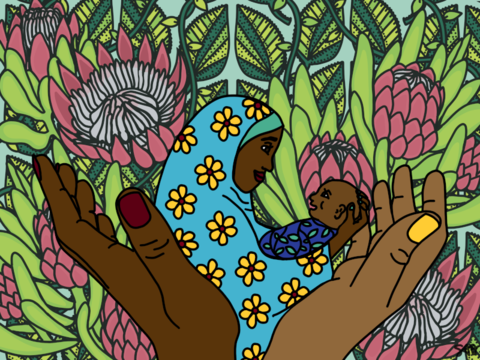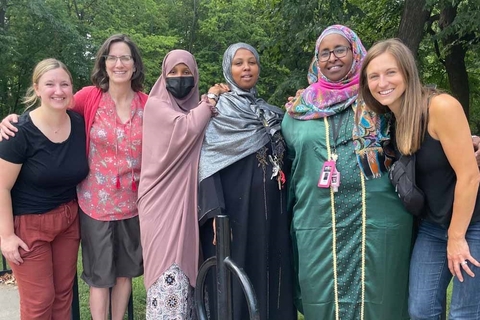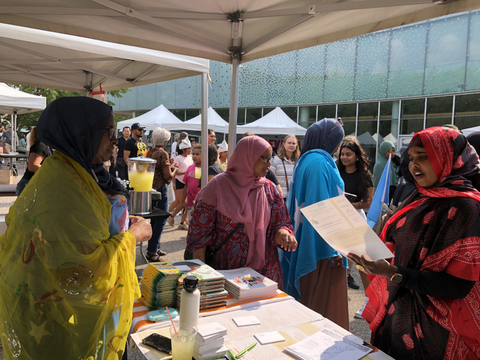The 40-Day Project supports Somali parents during the first five weeks after birth.
Read this story in machine-translated Somali
Becoming a new parent can be a transformative experience, filled with joy, challenges and profound changes. However, the transition after birth can also be overwhelming for many new parents, especially those facing isolation or lacking support. And while this is a critical time for both parent and child, Extension educator Cari Michaels says, “Often, the experiences of new parents are ignored as they typically focus on what their newborn needs versus what they need.”
To better support postpartum parents’ mental health and wellbeing, a group of moms has created the 40-Day Project — an initiative promoting wellness and self-care for Somali postpartum parents.
Born out of collaboration with Extension and the Minnesota Association for Children's Mental Health (MACMH), the project draws on expertise from various professional disciplines ranging from education to social work, childcare and children's mental health. MACMH Infant and Early Childhood Director Lauren Moberg says, “The 40-Day project works to support new parents by identifying gaps in resources and creating a community of support.”
Bridging connections to the Somali community are Maryan Ali, Ifrah Nur and Sahro Abdullahi, three mothers of Somali heritage dedicated to addressing the importance of mental wellbeing.
“We work with the Somali community, work with the larger community and work with different women. We know that mental health is not often talked about and as mothers, we want to normalize it in a caring and compassionate way,” says Abdullahi.
The first 40 days
While Somali culture supports a 40-day postpartum period when friends and family members provide organized support and care, this culture of support is often absent in the U.S.
Reflecting on her experiences as a young mother who faced nearly fatal complications during her first birth, Nur, a mother of ten, joined the project to support other parents.
“Back home, it was much easier to go through the postpartum period because someone was always available to help. You have your sisters, and you have your mom and her sister. People were just more available. And now, here, it's different. You don't have that much access to help,” Nur says. “I want to be there for other moms like me and help them navigate through the most difficult times.”
The 40-Day Project focuses on promoting self-care, establishing social connections and fostering mental wellbeing for parents during the first five weeks after birth. Split into five weekly themed sections, the project helps parents learn more about the postpartum period and how to navigate the parenting journey with educational materials and resources available in Somali and English.
It also offers resources for health care professionals and providers with materials like discussion guides to facilitate meaningful and culturally responsive conversations.
Shifting the narrative
One unique aspect of the 40-Day Project is its effort to shift the narrative surrounding postpartum mental health.
“There are lots of conversations happening about postpartum mental health and how to recognize it. However, there aren't many conversations about what it means to be well in the postpartum period. That’s what is special about this project. We normalize the challenges while helping parents find moments of joy to fuel them through those difficult moments,” says postpartum psychotherapist and mother of two Mollie Kohler.
Sending daily text messages to parents is just one way the team opens the conversation about wellbeing. “Parents who have signed up have shared how the text messages have offered them comfort and created a sense of community.” But it’s not just from the messages. “It’s the power of knowing they’re not alone,” says Kohler.
In addition to supportive messages, team members offer care packages with materials like self-care items, Somali lullaby books and hand-crafted nursing dresses. They also share their birth stories to let parents know that parenthood isn't perfect.
“Even if you have had a child, during every life stage, it is different. And I want moms of any age to get support and feel they can ask for help without being judged,” Ali says.
Vision for the future
As the 40-Day Project continues to make a difference in the lives of postpartum parents, it remains dedicated to building a strong and nurturing community where parents can find the support they need during their most challenging moments. Looking ahead, the project strives to expand its reach and embrace other languages and cultures, including Latino postpartum communities.
“So many of us immigrants have way more in common than we have differences. And the way you know that is through this project. The process of new life and change is something all parents, no matter their background, can relate to,” Ali says.
Learn more about the 40-Day Project and access educational materials
Visit the 40-Day Project sitePermission is granted to news media to republish our news articles with credit to University of Minnesota Extension. Images also may be republished; please check for specific photographer credits or limited use restrictions in the photo title.




